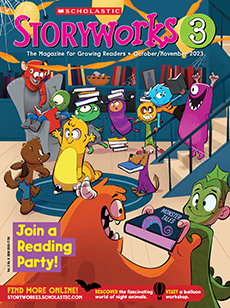I had an awesome day yesterday. My class learned about slime in science. I met a new friend during recess. After school, I went to a violin lesson. By the time I got home, I was so tired! I just wanted to relax. But I couldn’t . . . because I had homework to do!
I’ve done a little research. One study found that homework doesn’t make a big difference in test scores for younger students. Other studies showed that homework can make kids more stressed or worried. So if homework isn’t helping, why are teachers still assigning it?
Plus, some kids spend hours on homework. Kids could use that time to hang out with friends, play outside, or get a great night’s sleep. Then they could come to school feeling refreshed and ready to learn.
Besides, plenty of schools have already gotten rid of homework. My cousin lives in Long Beach, New York. The person in charge of schools there asked kids to “wonder, read, and play” instead of doing homework. That sounds amazing to me. I say we ditch this time waster!
Tired of homework,
Isabella

